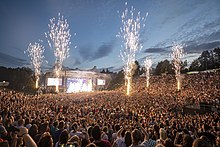Concert (event)


Concert (via Italian concerto from Latin concertare “to compete”, later and more rarely also Italian. Conserto , from Latin conserere “to join ”) in the sense of a music event is called the performance of music in front of an audience that has been gathered for this purpose (“ Audience "), usually on a suitable or specially built stage . This can be public or private. The term distinguishes itself from events where music is not the main thing.
history
The concert originated with the beginning of bourgeois musical life in the 18th century, mainly in London and Paris ( Concert spirituel ), and since the end of the century increasingly in other European metropolises. Was public musical performance without dance previously always with a religious or courtly Begängnis , with liturgy , ceremony or banquet been associated, it was for the first time as an end in itself-like practice of art understood in which humanity and emotion represent representative and entertaining.
The concert offered the possibility of a ritual that was independent of traditional religious and courtly ceremonies, but still possessed their luster. In addition, the audience could represent its education . The “bourgeois” appreciation of the musicians, who still had a serving function at court, played a role. Some concert societies made it compulsory for their members to know musical instruments. So the audience occasionally played on the podium, together with the invited soloists.
Purely instrumental concerts and those that were consistently performed by the same interpreters were rare until the 20th century. Most of the concerts were kind of a colorful evening . The demarcation to the dance event was not always clear, for example at the spa concert .
In opposition to bourgeois concerts, other types of concerts developed in the 20th century: while the jazz concert favors the club atmosphere that has developed from the older music halls , the pop or rock concert, which has been around since the late 1960s from the dance event, mostly the image of an informal mass gathering, also as an open-air concert . Concerts with a dress code are also common in this area.
For more specific types of events, there is a discussion concert with explanations or interviews, or the walking concert , which allows the audience to move around the room. Events by symphony orchestras that reach a mass audience include the New Year's Concert by the Vienna Philharmonic or the Last Night of the Proms .
See also
literature
- Fritz Rau: 50 Years Backstage - Memories of a Concert Organizer . Palmyra, Heidelberg 2005, ISBN 3-930378-65-5 .
- Walter Salmen: The concert. A cultural story . Beck, Munich 1988, ISBN 3-406-32918-7 .
- Hanns-Werner Heister: The concert. Theory of a culture form . Heinrichshofen, Wilhelmshaven 1983, ISBN 3-7959-0277-0 .
- Günter Heine, Philipp Truniger: The criminal liability of the concert promoter . In: Swiss Journal for Criminal Law , Bern 2010, pp. 83–100.
- Martin Tröndle (Ed.): The concert: New performance concepts for a classical form . transcript, Bielefeld 2009, ISBN 978-3-8376-1087-1 .
- Martin Tröndle (Hrsg.): Das Konzert II. Contributions to the research field of concert studies . transcript, Bielefeld 2018, ISBN 978-3-8376-4315-2 .
- Dagmar Glüxam: Concert (II). In: Oesterreichisches Musiklexikon . Online edition, Vienna 2002 ff., ISBN 3-7001-3077-5 ; Print edition: Volume 3, Verlag der Österreichischen Akademie der Wissenschaften, Vienna 2004, ISBN 3-7001-3045-7 .
Web links
- Hans Neuhoff - Concert Audiences: Social Structure, Mentalities, Taste Profiles (PDF; 938 kB)
- Archive of concert life - database and digital collection on the subject of concerts at the State Institute for Music Research Prussian Cultural Heritage.
Individual evidence
- ↑ concert. In: Friedrich Blume (Hrsg.): The music in past and present (MGG). First edition, Volume 7 (Jensen - Kyrie). Bärenreiter / Metzler, Kassel et al. 1958, DNB 550439609 , Sp. 1556
